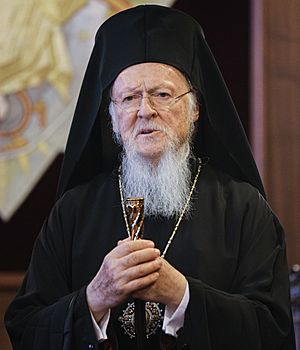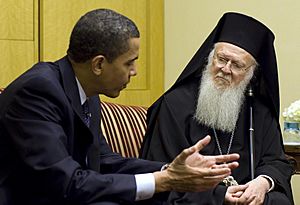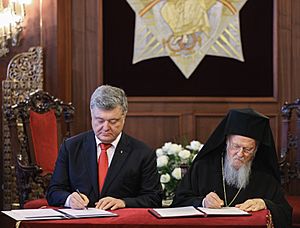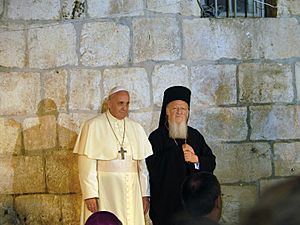Bartholomew I of Constantinople facts for kids
Quick facts for kids Bartholomew |
|
|---|---|
| Ecumenical Patriarch of Constantinople | |

Bartholomew in 2018
|
|
| Church | Ecumenical Patriarchate of Constantinople |
| Diocese | Constantinople |
| See | Istanbul |
| Enthroned | 2 November 1991 |
| Predecessor | Demetrios |
| Orders | |
| Ordination | 19 October 1969 |
| Consecration | 25 December 1973 by Ecumenical Patriarch Demetrios |
| Personal details | |
| Birth name | Dimitrios Archontonis (Δημήτριος Αρχοντώνης, Dimítrios Archontónis) |
| Born | 29 February 1940 Zeytinliköy, Gökçeada, Turkey |
| Denomination | Eastern Orthodox |
| Residence | Fener, Istanbul, Turkey |
| Parents |
|
| Alma mater | Patriarchal Theological School (Halki seminary) |
| Signature | |
| Coat of arms |  |
| Styles of Ecumenical Patriarch Bartholomew of Constantinople |
|
|---|---|
| Reference style | His All Holiness |
| Spoken style | Your All Holiness |
Bartholomew (born Dimitrios Archontonis on February 29, 1940) is the current Ecumenical Patriarch of Constantinople. He has held this important role since 1991. He is seen as the "first among equals" (primus inter pares) in the Eastern Orthodox Church. This means he is a spiritual leader for Eastern Orthodox Christians around the world.
Bartholomew was born in a village called Agios Theodoros on the island of Imbros, which is now part of Turkey. He studied at the Patriarchal Theological Seminary of Halki and became a priest. Before becoming Patriarch, he served in other important church roles.
During his time as Patriarch, Bartholomew has worked to bring different Christian churches closer. He has also talked with leaders of other religions, like Muslims. He is known for his efforts to protect the environment, earning him the nickname "The Green Patriarch." He also works to promote religious freedom and human rights.
In 2018, the Moscow Patriarchate stopped communicating with the Ecumenical Patriarchate. This happened because of disagreements over Bartholomew's decision to grant independence to the Orthodox Church of Ukraine.
Early Life and Education
Dimitrios Archontonis was born in 1940 in the village of Agioi Theodoroi on the island of Imbros. His parents, Christos and Meropi Archodónis, were both Greek. He was the youngest of four children. As a boy, he helped his father in his coffee shop, which also served as a barber's.
He started his schooling on Imbros. Later, he attended high school in Istanbul. He then went to the Theological School of Halki on Heybeliada island. There, he earned a doctorate in theology.
After his studies, he served in the Turkish army. From 1963 to 1968, he continued his studies in Rome, Switzerland, and Munich. He earned another doctorate from Gregorian University in Rome. During this time, he learned several languages, including Latin, Italian, French, English, and German.
Becoming a Church Leader
Bartholomew's journey in the church involved several important steps:
- On August 13, 1961, he became a deacon and received the church name Bartholomew.
- On October 19, 1969, he became a priest.
- On December 25, 1973, he became a bishop.
- On January 14, 1990, he became the metropolitan of Chalcedon.
- On October 22, 1991, he was chosen as the Archbishop of Constantinople and Ecumenical Patriarch.
- On November 2, 1991, he was officially enthroned in the Patriarchal Cathedral.
Bartholomew's Leadership as Patriarch

As Ecumenical Patriarch, Bartholomew has been very active around the world. One of his main goals was to help rebuild the Eastern Orthodox churches in countries that were once part of the Eastern Bloc. These churches had faced difficulties under Communist rule. He has worked to make the different national churches of the Eastern Orthodox Church stronger together.
He has also continued talks with the Catholic Church to bring them closer. He started conversations with other faiths too, including other Christian groups, Muslims, and Jews.
Protecting the Environment
Bartholomew is well-known for his strong support of environmental protection. He has used the Ecumenical Patriarchate's influence to support many international environmental causes. Because of his work, people call him "the Green Patriarch" or "the Green Pope." In 2002, he received the Sophie Prize for his environmental efforts. He also received the Congressional Gold Medal, a very high award from the United States government.
Religious Freedom in Turkey
Bartholomew has spoken about religious freedom in Turkey. He has pointed out that the Halki seminary, a theological school, was closed. He believes that as Turkish citizens, Orthodox Christians should have the same rights as others. He has also insisted on keeping his title "Ecumenical Patriarch," explaining that it has no political meaning.
Working with Other Churches
Bartholomew has worked to improve relations with other Christian churches. In November 2006, Pope Benedict XVI visited Istanbul at Bartholomew's invitation. The Pope attended a special church service. This was the third time a Pope had visited the Ecumenical Patriarchate.
Bartholomew also attended the inauguration of Pope Francis in 2013. This was the first time an Eastern Orthodox leader had attended a papal inauguration since the East–West Schism in 1054. Later, he invited Pope Francis to travel with him to the Holy Land in 2014. This trip marked 50 years since a historic meeting between Patriarch Athenagoras I of Constantinople and Pope Paul VI.
Helping Refugees and Promoting Peace
On April 16, 2016, Bartholomew visited the Moria Refugee Camp on the island of Lesbos. He went with Pope Francis and Archbishop Hieronymus II to draw attention to the refugee crisis. In December 2018, he visited the Korean Demilitarized Zone (KDZ). There, he prayed for lasting peace and unity on the Korean Peninsula.
Independence for the Orthodox Church of Ukraine

In October 2018, the Ecumenical Patriarchate decided to grant autocephaly (self-governance) to the Orthodox Church of Ukraine. This decision meant that the Ukrainian Orthodox Church would be independent. It also reversed an old agreement from 1686 that had placed the Ukrainian church under the Russian Orthodox Church.
In response, the Russian Orthodox Church announced that it was cutting ties with the Ecumenical Patriarchate. This event marked the beginning of the 2018 Moscow–Constantinople schism. On January 5, 2019, Bartholomew officially granted independence to the new Orthodox Church of Ukraine.
Vatican Gift of Saint Peter Bone Fragments
On July 2, 2019, Pope Francis gave Bartholomew nine bone fragments. These fragments are believed to belong to Saint Peter. Pope Francis had publicly shown them in 2013. Bartholomew described the Pope's gift as "brave and bold."
Macedonian Orthodox Church
In 2022, the Ecumenical Patriarchate welcomed the Macedonian Orthodox Church – Archdiocese of Ohrid into full communion. This recognized North Macedonia as a proper church region.
Views on the Russian Invasion of Ukraine

Bartholomew has strongly criticized both the Russian government and the Russian church regarding the Russian invasion of Ukraine. He has called it a crime of aggression. He believes it has caused great suffering to both Ukrainian and Russian people. He stated that the Russian church's teachings tried to justify an "unjust, unholy, unprovoked, diabolical war."
Awards and Honors
Bartholomew has received many awards and honors from around the world. These recognize his important work in religion, peace, and the environment.
Special Awards
- In 1997, he received the Congressional Gold Medal from the United States. This is one of the highest civilian awards in the U.S.
- In 2002, he received the Sophie Prize for his work on the environment.
- In 2012, he received the Four Freedoms Award for the Freedom of Worship.
- In 2013, he received the Global Thinkers Forum Award for Excellence in Peace and Collaboration.
- In 2019, he received the Plaque of St. Erik for promoting religious freedom and caring for creation.
- In 2021, he received the Human Dignity Award from the American Jewish Committee. This award recognized his care for humanity and the environment, and his work to bring different religions together.
- In April 2025, he was awarded the Templeton Prize. This prize recognized his efforts to connect science and spirituality, and to encourage people of different faiths to protect the natural world.
Academic Honors
Bartholomew has received many honorary doctorates from universities around the world. These include:
- Hankuk University of Foreign Studies in South Korea (2005)
- Fordham University in the United States (2009)
- The Hebrew University in Jerusalem (2017)
- National University of Kyiv-Mohyla Academy in Ukraine (2018)
- University of Notre Dame in the United States (2021)
- The University of Notre Dame Australia (2024)
See also
 In Spanish: Bartolomé I para niños
In Spanish: Bartolomé I para niños
- Ecumenism
- History of the Eastern Orthodox Church
- List of ecumenical patriarchs of Constantinople
 | Dorothy Vaughan |
 | Charles Henry Turner |
 | Hildrus Poindexter |
 | Henry Cecil McBay |


